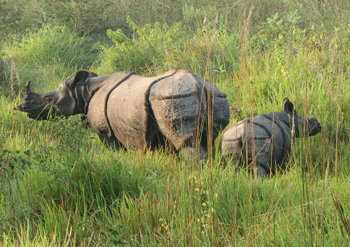Rhino transfer to Bardiya protested citing security
Chitwan, February 29
Almost one-and-a-half dozen organisations working for animal rights have started protesting the authority’s recent decision to transfer five rare one-horned rhinoceros from Chitwan National Park to Bardiya National Park.
Preparations are under way to transfer two rhinos on tomorrow and three on Wednesday to Bardiya.
Representatives of various organisations handed over a memo to Chief District Officer Binod Prakash Singh today, saying that Bardiya National Park lacked conducive atmosphere and security for the animals.
The organisations claimed that the rhinos, which were earlier transferred to Bardiya from Chitwan, had failed to survive. As many as 83 rhinos were transferred to Bardiya earlier, but only 29 of them are alive.
Receiving the memo from the rights activists, CDO Singh pledged to take the issue to the concerned authority immediately.
Stating that it wasn’t under his jurisdiction to meddle with the administration’s decision, he said the issue should be addressed through state’s policy and programmes.
Organisations representing Smuggling Control Youth Campaign, Bird Education Society, Sauraha, Regional Hotel Association, Bio-diversity Stakeholders’ Society, journalists and professors, among others have been protesting against the transfer.
Chitwan National Park Chief Conservation Officer Ram Chandra Kandel said they had decided to transfer the animals to maintain variation, prevent epidemic, flooding dangers and increase the population of healthy rhinos.
Meanwhile, Ramesh Kumar Thapa, Chief Conservation Officer of Bardiya National Park, claimed that they had managed good security and habitat for the rhinos this time.
According to the National Park and Department of Wildlife Conservation, as many as 82 rhinos were transferred to Bardiya National Park and five to Shuklaphanta Wildlife Reserve until 2003.
There are 645 rhinos in Nepal as per last year’s census. Of them, 605 are in Chitwan National Park, 29 in Bardiya National Park and 8 in Shuklaphanta Wildlife Reserve.
“As more than 70 rhinos transferred from Chitwan were killed by poachers in the late years, the security situation has been beefed up this time in Bardiya,” claimed Thapa.
As many as 12 security posts have been established in the Babai area, where there was not a single post earlier.
A total of 65 kilometre forest road has also been constructed to reach the Babai region.
There is a Nepali Army Barrack and they have been provided with Identity-based Rhino Monitoring and Real Time Smart Patrolling Training.
According to Thapa, as many as 19 consumers’ committees have been formed in the northern belt of Babai region and are used for rhino conservation.
People from the region had handed as many as 250 weapons to the national park administration of late.
Thapa said as many as 80 staff have been recruited for rhino conservation in the national park. Around 600 hectare land and 10 wetlands have been managed in Babai Valley for food and habitat of the rhinos.
Bardiya National Park, occupies 968 square kilometres in Banke and Surkhet districts.






